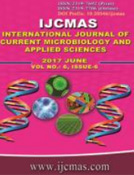


 National Academy of Agricultural Sciences (NAAS)
National Academy of Agricultural Sciences (NAAS)

|
PRINT ISSN : 2319-7692
Online ISSN : 2319-7706 Issues : 12 per year Publisher : Excellent Publishers Email : editorijcmas@gmail.com / submit@ijcmas.com Editor-in-chief: Dr.M.Prakash Index Copernicus ICV 2018: 95.39 NAAS RATING 2020: 5.38 |
Natural vinegar is a food supplement, tonic and nutraceutical produced by twin fermentation of sugar to acetic acid via ethanol. The fermentation of grape and guava juice carried out by Saccharomyces cerevisiae MTCC 11815 produced 9.25% (v/v), 9.32% (v/v) of ethanol with a fermentation efficiency of 92.6%, 93.9% in 72 h and 96 h, respectively. The optimized conditions for sugarcane vinegar production were also validated for grape and guava vinegar production up to 5L in PVC column reactors that yield 6.2% (w/v) and 6.1% (w/v) volatile acidity in 8-10 days, respectively. The grape and guava vinegars possessed in vitro antioxidant potential with total free radical scavenging activities with EC50 and AEAC values of 83.4% and 88.9%, 63.6 and 57.0; 0.27 µM and 0.30 µM, respectively. Both the vinegars had a mean sensory score of 7.52±0.75 Grape and 7.60±0.83 Guava in comparison to a commercial brand having 8.48±0.59 score.
 |
 |
 |
 |
 |